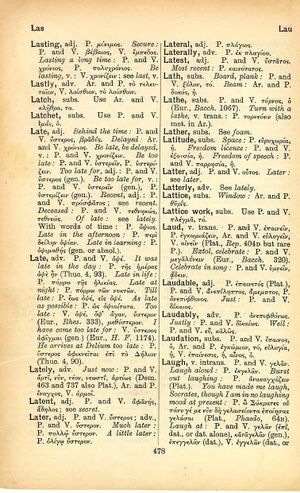later
ἐβόα καὶ βαρβαρικῶς καὶ Ἑλληνικῶς → shouted out both in Persian and Greek, shouted out in the barbarian tongue and in Greek
English > Greek (Woodhouse)
adj.
P. and V. ὕστερος; adv., P. and V. ὕστερον. Much later: P. πολλῷ ὕστερον. A little later: P. ὀλίγῳ ὕστερον.
Latin > English (Lewis & Short)
lăter: ĕris, m. Sanscr. root prath-, widen; prathas, breadth; Gr. πλατύς, πλάτος>,
I a brick, tile.
I Lit.: nil mirum, vetus est maceria, lateres si veteres ruunt, Plaut. Truc. 2, 2, 49 sqq.: in latere aut in caemento, ex quibus urbs effecta est, Cic. Div. 2, 47, 98; cf.: paries crudo latere ac luto constructus, Col. 9, 1, 2: contabulationem summam lateribus lutoque constraverunt, Caes. B. C. 2, 9: lateres de terra ducere, to make, Vitr. 2, 3, 1: lateres coquere, to burn, id. 1, 5: sepimentum e lateribus coctilibus, burnt bricks, Varr. R. R. 1, 14, 4.—Prov.: laterem lavare, to wash a brick, = πλίνθον πλύνειν, i. e. to wash the color out of a brick, to labor in vain, Ter. Phorm. 1, 4, 8; but cf. Lucil. Sat. 9, 19.—
II Transf.: lateres aurei, argentei, bars, ingots, or wedges of gold, of silver, Plin. 33, 3, 17, § 56; Varr. ap. Non. 131, 15; 520, 17.

